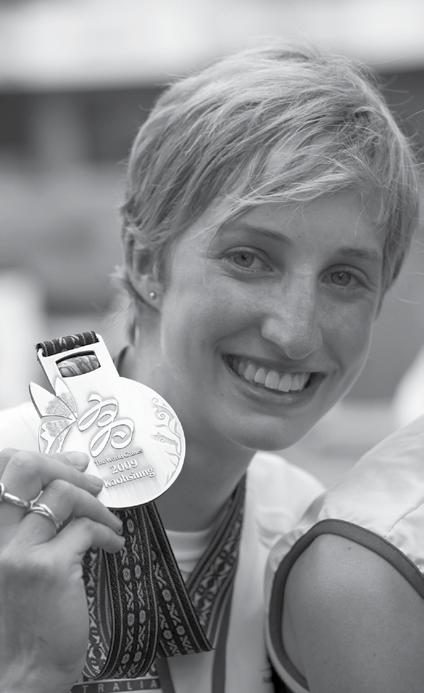
10 minute read
WORLD GAMES
Gold and Silver to Hanny Allston at World Games in Taiwan
Hanny Allston went to the World Games in Kaohsiung, Taiwan, with high hopes of doing well. But she had some formidable opponents in the field – Finland’s Minna Kauppi is reigning Middle Distance World Champion and also took silver in the Sprint last year. Dana Brozkova from Czech Republic is reigning World Champion at Long Distance, and the Swedes Kajsa Nilsson and Linnea Gustafsson both have fine reputations.
IN a pre-Games interview with the IOFs Erik Borg, Hanny said, “I am certainly excited to be part of The World Games that I understand is the second largest sporting event in the world”. Hanny Allston won The World Games Middle Distance title by the impressive margin of 76.4 seconds. Erik Borg wrote: “The Australian showed remarkable strength at Chengcing Lake. She has taken new steps forward since she became a World Champion in 2006”. Hanny had a smooth run and stuck to her race plan, which involved taking safe routes, staying out of the forested green areas and sticking to the tracks as much as possible. It payed off with a dominating run, 1min 16.4sec clear of second placed Minna Kauppi of Finland. Hanny’s gold medal is the second for an Australian at a World Games following Grant Bluett’s win in Japan in 2001. The second half of the women’s team, Kathryn Ewels, was 19th after losing small amounts of time at the #3 and #13 controls. Julian Dent achieved his best international result to date in the men’s race, taking 13th place with a solid run. Simon Uppill, the first finisher for the day, was 23rd. After the race Hanny told Erik Borg, “I had a good race. I followed my plan exactly. I planned to run carefully and not at full speed, and look for the fastest route choices and take the safest of them. I ran for example to the corners of buildings or the tops of hills instead of taking short cuts”. She told Erik, “I orienteer more safely now. I have become more a navigator than a competitor. I have more control in my way of orienteering. I have also improved my running and I am stronger”. Hanny told Erik Borg it’s impossible to compare the 2006 World Championships gold and the gold at this year’s World Games. Both are big successes, but they are very different events. While Hanny was the first Australian to win at the World Championships, she is the second to win at The World Games; Grant Bluett won the individual distance in Akita in 2001. It’s a bit special to follow in his footsteps. “He has been an idol for me when I started orienteering”, said Hanny. In the Sprint event the previous day, Hanny took the silver medal. An early starter, she led the field for much of the day but her time was eventually beaten by Minna Kauppi of Finland, who took the title by 23 seconds, most of which was set up in the first part of the course. Norway’s Elise Egseth was third. Kathryn Ewels placed 15th, 1min 34sec further back. In the Men’s event, both the Australians finished in midfield positions. Simon Uppill was 17th, his best international result to date, while Julian Dent was 22nd after losing time on the second half of the course. Andrey Khramov (Russia) edged out Daniel Hubmann (Switzerland) by 1.6 seconds for the gold medal, with Tero Föhr (Finland) taking bronze. Another noteworthy result was a tenth place for New Zealand’s Photo: Erik Borg Ross Morrison. In the final event, the Relay, the Australian team equalled its best Relay placing (4th) in major international events. In The World Games Relay teams consist of four runners – two women and two men. Russia led the men into the changeover after the first leg, ahead of Sweden and Norway. Simon Uppill was with the leaders at the first spectator control, dropping a few places in the second half of the course. Kathryn Ewels took over and ran a great second leg, losing very little time to the leaders, where Sweden overtook Russia at the end of the second leg. Andrey Khramov, the Sprint gold medallist, chased down Peter Oeberg of Sweden to give the lead back to Russia. Chasing were Julian Dent and the Middle Distance gold medallist Daniel Hubmann. Julian was with the Swiss runner for much of the course, and kept Australia in the medal hunt being in 5th place at the changeover, just behind Tero Föhr of Finland and ahead of Norway’s Østerbø. The leading runners from Sweden and Switzerland made errors on the early part of the final leg, allowing Minna Kauppi of Finland, the Sprint gold medallist to move into second place. Australia and Norway were battling for third and fourth, with Elise Egseth holding off Hanny Allston for the bronze medal. The Australian Boomerangs team for the Relay was 1. Simon Uppill AUS 7th place, 1 min 20 secs behind the leader; 2. Kathryn Ewels AUS 4th place, 1 min 53secs behind the leader; 3. Julian Dent AUS 5th place, 2 mins 18 secs behind the leader; 4. Hanny Allston AUS 4th place, 2 mins 3 secs behind the winner. The Team said they were stoked with the result, and happy to show the Europeans that Australia can match it with them! This year’s World Games was the eighth. Thirty one sports were on the program. In total, 4700 athletes from 105 nations took part, a record in terms of the number of sports, athletes and nations. Orienteering made its début on the program of The World Games in Akita, Japan, in 2001. This year was the third time for Orienteering to be part of this huge, highly successful multi-sport competition. And, for the first time, a Sprint was added to the program, making three Orienteering events. At previous World Games it had been just two – Middle Distance and Relay.
Expert Assistance Creates a most Successful Event
Christine Brown - IOF Senior Event Adviser
THE 8th World Games, held every 4 years, were held in the city of Kaohsiung in Taiwan (a.k.a. Chinese Taipei). The World Games are affectionately known as “the Olympics for non-Olympic sports” and this was the 3rd time Orienteering was included. Inclusion in The World Games is a significant intermediate goal of the International Orienteering Federation (IOF) in its ultimate aim to get Orienteering included in the Olympics. The World Games in Kaohsiung certainly proved that Orienteering, with the help of the appropriate technology, can be an exciting spectator sport as evidenced by the thousands of hits on the live internet broadcast. At previous World Games the Orienteering was limited to a Middle Distance competition and a mixed Relay. This time a third discipline, the Sprint was added. As no extra days could be added to the competition schedule this added extra demands to the existing schedule, forcing the Model event to be held on the same day as the opening ceremony. After being appointed as the IOF Senior Event Adviser in 2006 I made my initial visit to Kaohsiung in January 2007. It took anther two visits before the final visit in July to ensure that everything was on track. There was an enthusiastic core group of orienteers from the local association CTOA. It was apparent from an early stage that their experience was limited and the IOF committed the support to ensure that the Orienteering competitions at The World Games would be suitable for athletes & spectators and have TV and internet coverage for the rest of the world watching the Games. Ultimately a combined team of skilled organisers was assembled from CTOA, Denmark, Norway, Sweden, Switzerland and Australia. The World Games organising committee took care of many of the non-Orienteering specific aspects such as transport, accommodation and catering. This meant that the assembled team were able to concentrate on the Orienteering specific aspects and brought to life fantastic courses in the urban settings of the Kaohsiung Museum of Fine Arts and Chengcing Lake. To comply with the wish of International World Games Association (IWGA) that all competitions in the Games are close to the host city it was decided to hold all Orienteering events within the city boundaries rather than in a more traditional bush setting. As well as introducing the Sprint to the Games schedule we also sought a deviation from the rules of Foot Orienteering and ran the Middle Distance and Relay competitions on a 1:5000 map prepared using ISSOM. Feedback indicated that this innovation was a success. Innovation can have its place in major events. The final result proved that a major event could be put together and be available to the world. IWGA board members who were present at the event were impressed by the professionalism with which the event was organised and, coming from a limited background of Orienteering knowledge, were able to understand what was happening. This was possible through the use of TracTrac, a large video screen, good commentary and on-screen graphics.
Australia first tasted success at the World Games with Grant Bluett winning a gold medal in 2001. In 2009 Hanny Allston proved that she is a world class athlete by winning gold (Middle Distance) and silver (Sprint) medals. The Australian team narrowly missed out on a bronze medal, finishing 4th in the Relay, an outstanding performance in a strong field. It was a pleasure to be there both as an organiser and as a spectator. In 2013 the World Games will be held in Cali, Colombia – what an Orienteering experience that will be!
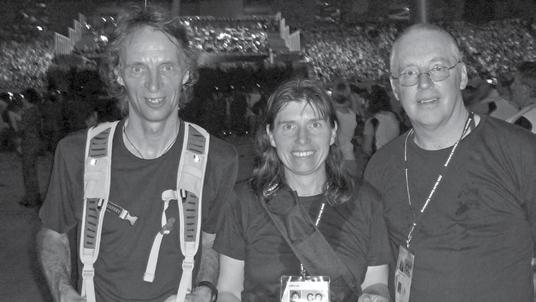
Australian Opening Ceremony officials, Paul Pacque, Christine Brown and Mike Dowling
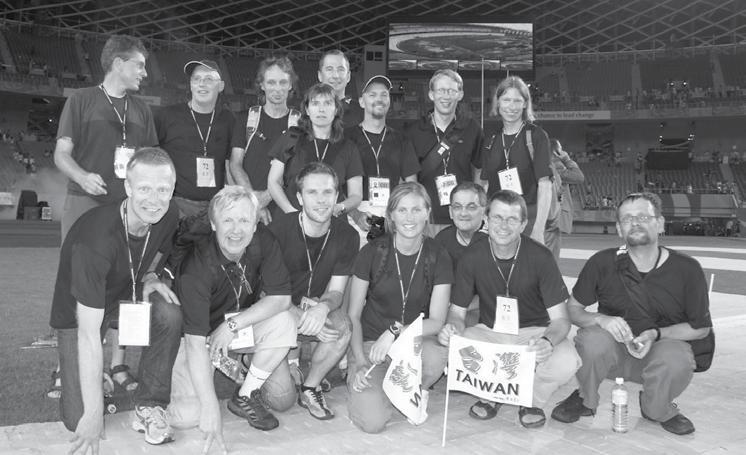
IOF Officials team


Hanny Allston on the podium with Minna Kauppi (left) and Linnea Gustafsson (right). Photos: Rob Preston
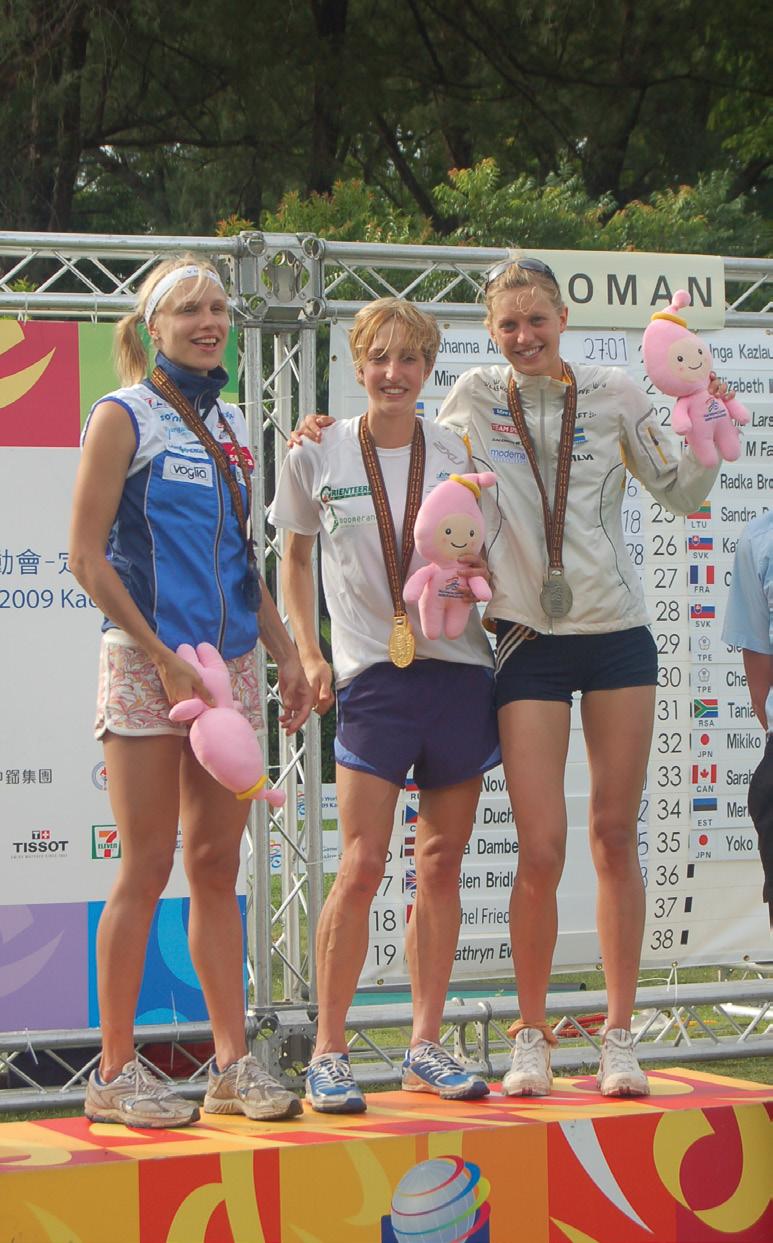
MIDDLE DISTANCE – WOMEN
1. Hanny Allston AUSTRALIA 27:01.0 2. Minna Kauppi FINLAND 28:17.4 3. Linnea Gustafsson SWEDEN 28:44.4 4. Signe Søes DENMARK 28:49.2 5. Aija Skrastina LATVIA 29:16.5 6. Dana Brozkova CZECH REPUBLIC 29:18.0 19. Kathryn Ewels AUSTRALIA 32:08.4
MIDDLE DISTANCE – MEN
1. Daniel Hubmann SWITZERLAND 27:43.4 2. Dmitriy Tsvetkov RUSSIA 28:16.6 3. Andrey Khramov RUSSIA 28:51.8 4. Tero Föhr FINLAND 29:00.3 5. Mattias Millinger SWEDEN 29:01.2 6. Øystein Kvaal Østerbø NORWAY 29:32.1 13. Julian Dent AUSTRALIA 31:08.5 23. Simon Uppill AUSTRALIA 32:28.9
SPRINT – WOMEN
1. Minna Kauppi FINLAND 14:17.7 2. Hanny Allston AUSTRALIA 14:40.0 3. Elise Egseth NORWAY 14:53.8 4. Rahel Friederich SWITZERLAND 15:05.1 5. Linnea Gustafsson SWEDEN 15:06.8 6. Sarah Rollins GREAT BRITAIN 15:25.4 15. Kathryn Ewels AUSTRALIA 16:14.1
SPRINT – MEN
1. Andrey Khramov RUSSIA 13:11.2 2. Daniel Hubmann SWITZERLAND 13:12.8 3. Tero Föhr FINLAND 13:46.5 4. Øystein Kvaal Østerbø NORWAY 13:49.1 5. Matthias Mueller SWITZERLAND 14:00.7 6. Lars Skjeset NORWAY 14:07.2 17. Simon UPPILL AUSTRALIA 14:41.6 22. Julian DENT AUSTRALIA 15:03.2
RELAY
1. Russia 1:55:07.7 2. Finland 1:56:38.0 3. Norway 1:56:48.9 4. Australia 1:57:11.3 5. Denmark 1:59:15.8 6. Latvia 1:59:19.1
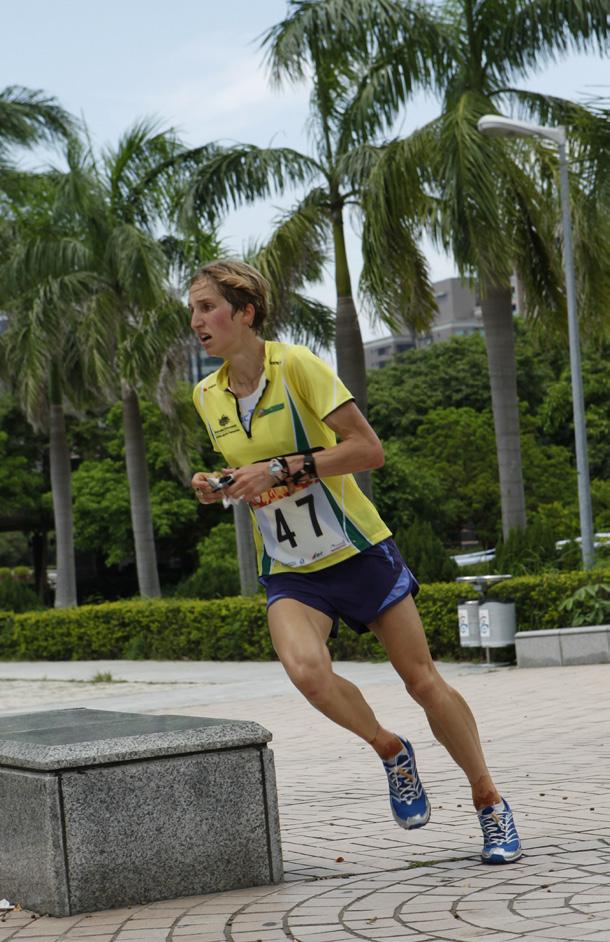
Hanny – silver in the Sprint. Photo: Erik Borg

Julian Dent. Photo: Rob Preston
WORLD GAMES WOMEN’S SPRINT

MAP AND PHOTOS
Museum of Fine Arts Scale 1:4000 2m contours
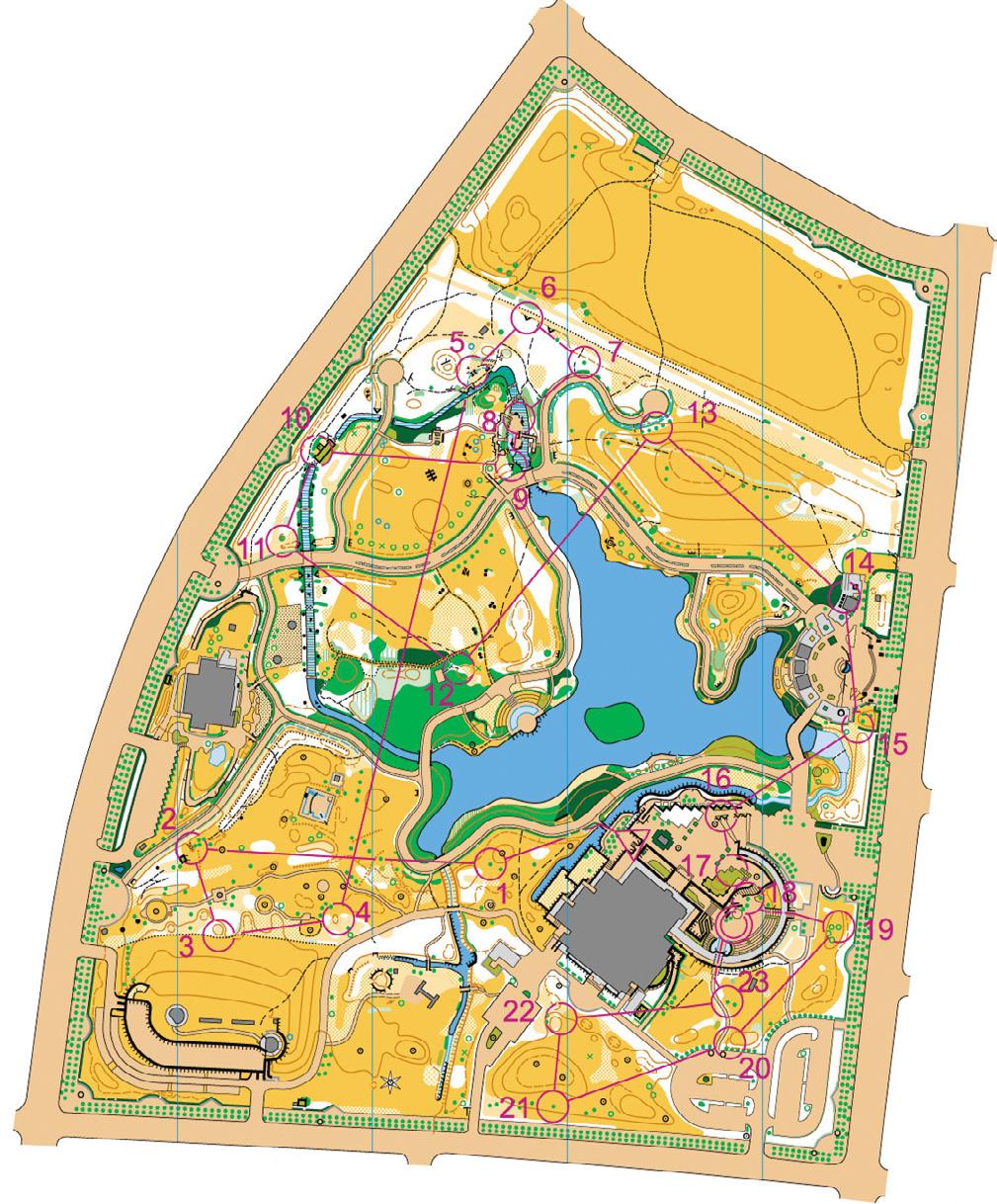
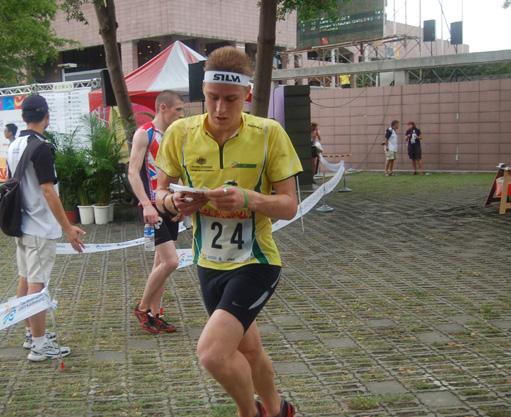
Switzerland’s Daniel Hubmann, 2nd in the Men’s Sprint. Photo: Rob Preston
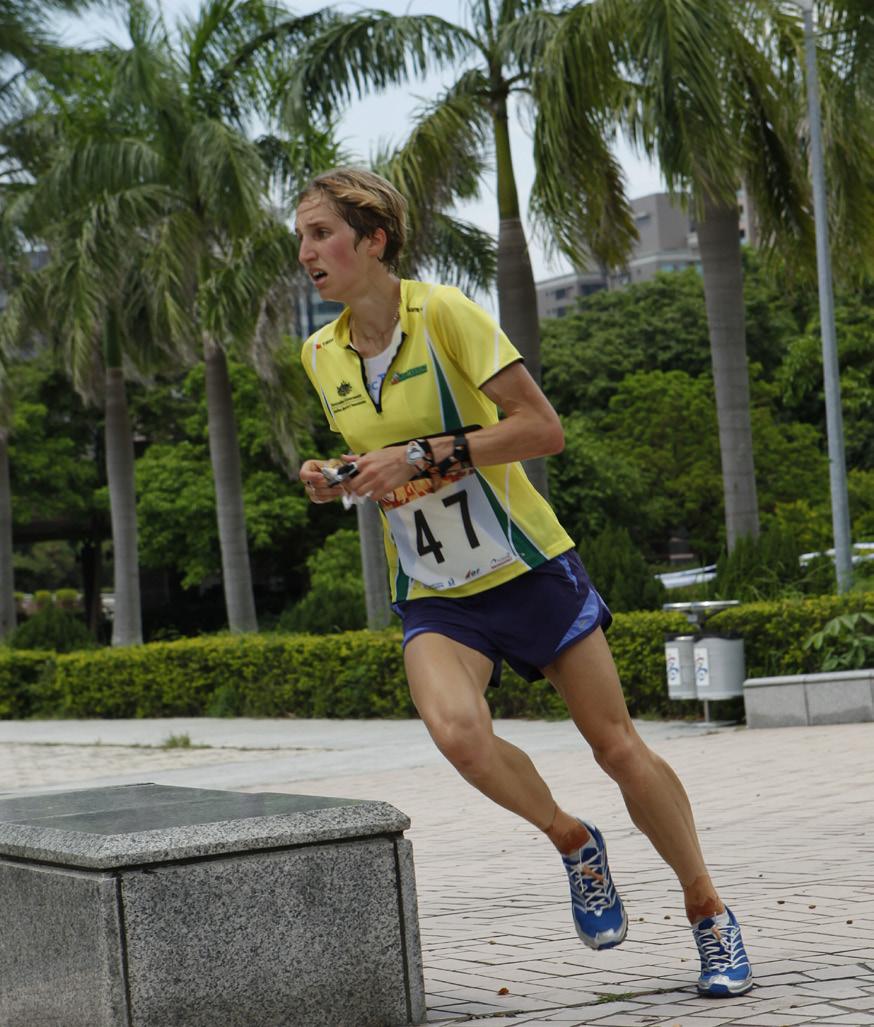
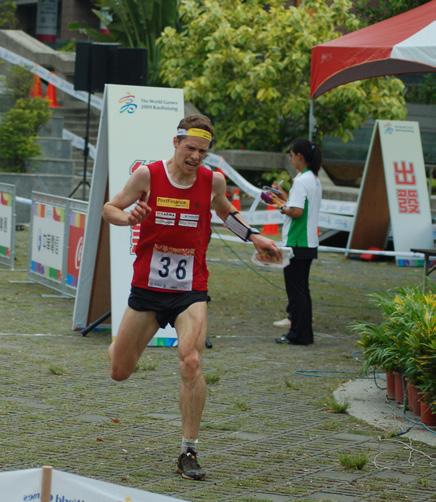
Kathryn Ewels, second leg runner
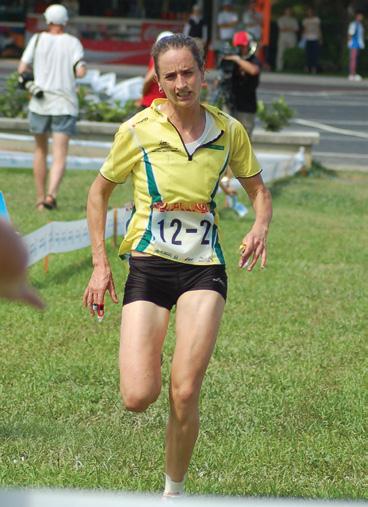
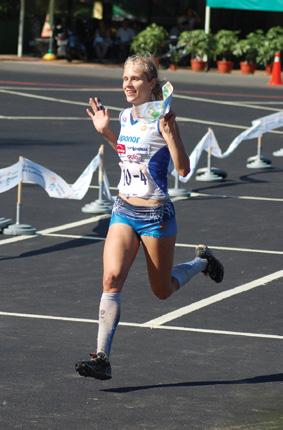
Minna Kauppi brings the Finnish team in for a silver medal

Hanny anchoring the Aussie team to a 4th place finish WORLD GAMES RELAY
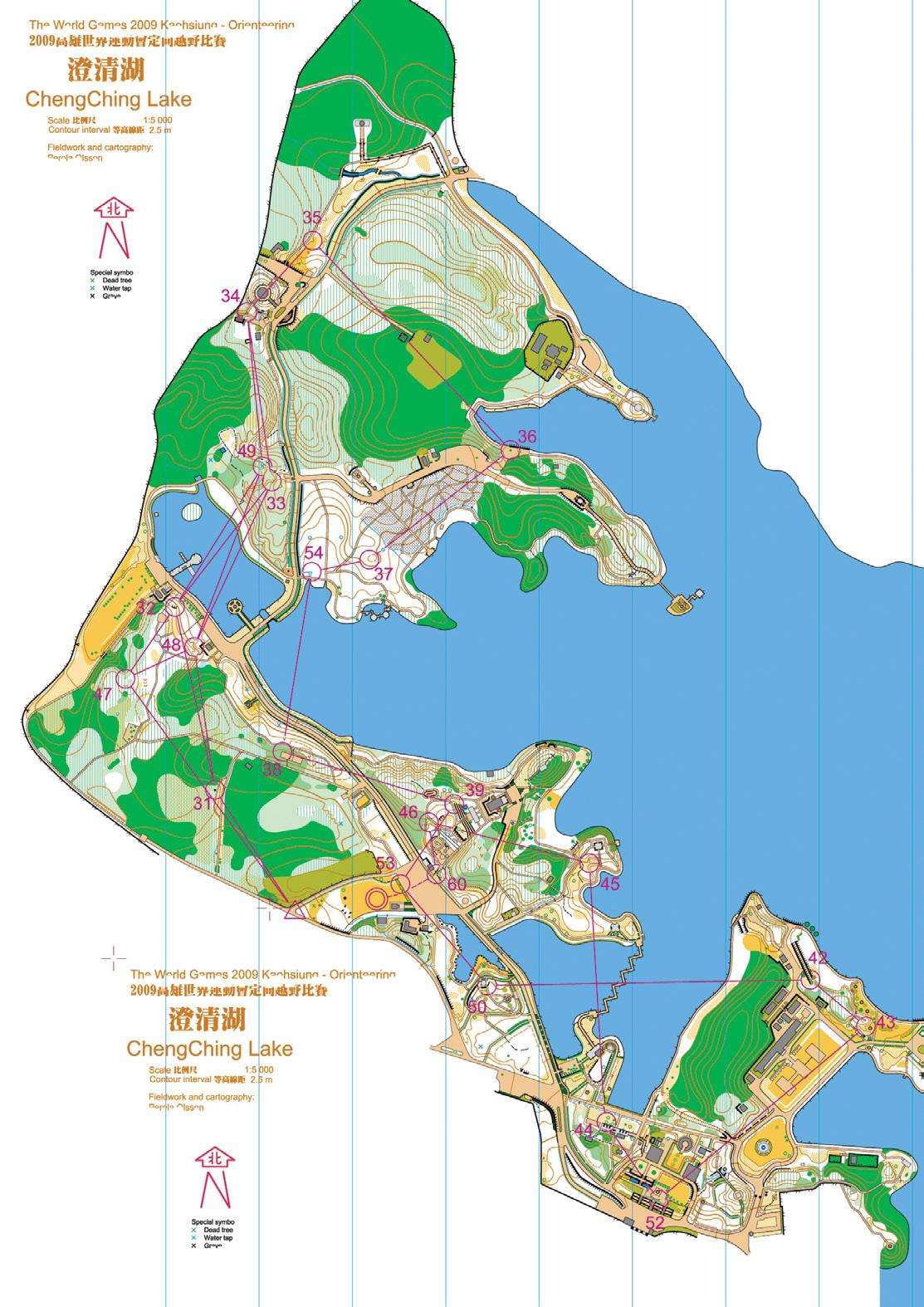
MAP AND PHOTOS
Photos: Rob Preston
Juian Dent hands over to Hanny Allston for the final leg












